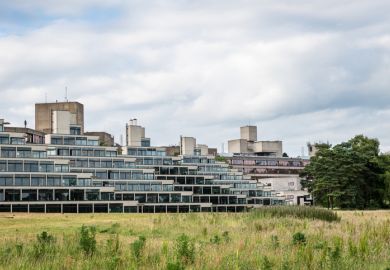Ambitious plans for the University of Essex’s biggest ever expansion in staff numbers are driven by a desire to benefit students while increasing “research power” and come off the back of big growth in student numbers – during a time of overall pessimism about UK university finances.
The university has announced proposals to create 100 new academic and 50 new professional posts, in what would be the largest expansion of staff in its 55-year history.
The plans come at a time of job cuts and warnings over serious financial problems at other universities, rising pension costs for institutions and fears over the potential impact of Brexit on research funding and student recruitment.
The expansion is “the product of a lot of careful thought and hard work...over the last five years or so”, Essex vice-chancellor Anthony Forster told Times Higher Education. The investment in a “step-change in staffing” is in response to record levels of student recruitment, increased levels of external funding for research and the university’s overall financial health.
The increase in staff levels will be funded by increased student numbers, “cash surpluses” generated of 4 to 6 per cent of income per year and work on economies of scale. There has been an increase in student applications since 2013, with a 52 per cent growth in undergraduate enrolments and a 19 per cent increase in postgraduate enrolments.
George Osborne, the former chancellor, abolished student number controls at English universities in 2015. And while that policy to create a market in recruitment has led to big drops in student numbers and resulting financial worries at some universities, others have been able to expand.
Professor Forster said that being recognised as THE University of the Year, achieving teaching excellence framework gold, improved league table positions and being in the top 15 for student satisfaction in the National Student Survey have all helped make Essex attractive to both students and academics.
Essex’s new strategic plan includes further increasing student numbers from about 16,000 at present to about 20,000 students by 2025. The university aims to reduce the student-to-staff ratio from about 16.3:1 to about 14.5:1.
“We know that students tell us that investment in staff really matters to them,” said Professor Forster.
He added: “Growing the number of researchers will help us in terms of research power as well as research quality.”
Essex hopes to double the number of staff submissions to the research excellence framework in 2021 compared with 2014 numbers, to a new total of 640.
But will Brexit throw a spanner in the works of Essex’s expansion plans? Thirty per cent of staff and 40 per cent of students at the university are from outside the UK.
“We are a global university and any negative impact of Brexit on UK higher education would be a concern to us, but we are not just a passive bystander in this,” said Professor Forster.
Restating the case for global Britain “matters more than ever” and regional offices have been opened across the world and international staff reassured, he added.
“We are not just accepting that Brexit is something that will happen and that we have very few ways in which we can respond,” he continued.
“There are many, many, things we can do and we are doing to make sure we get our fair share of fantastic students from the EU 27 countries and likewise on recruiting international staff.”
Register to continue
Why register?
- Registration is free and only takes a moment
- Once registered, you can read 3 articles a month
- Sign up for our newsletter
Subscribe
Or subscribe for unlimited access to:
- Unlimited access to news, views, insights & reviews
- Digital editions
- Digital access to THE’s university and college rankings analysis
Already registered or a current subscriber? Login








